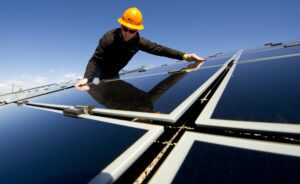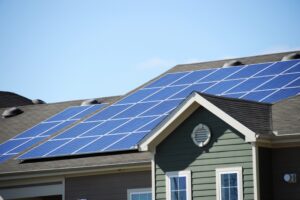Alberta 
Energy workers switch to other professions in droves as work dries up in once booming sector
 According to social media website LinkedIn’s Workforce Insights’ December newsletter, resource workers have traditionally been “much less likely” than others to switch industries. But that’s changing: by early 2020, nearly 60 per cent of displaced energy and mining industry workers starting new jobs found opportunities in other industries. Manufacturing was the foremost destination, followed by construction, software and IT services, corporate services, and finance. Unemployment among oil and gas workers in particular peaked at 16.1 per cent in 2020, reducing the workforce to 26 per cent below 2014 levels, according to PetroLMI, an industry labour market information provider. And while things have improved, with LinkedIn reporting that its hiring rate in the resource sector was up 12.7 per cent in November from two years previous, it lagged the hiring rate for all industries, which grew 19.7 per cent. Source: Edmonton Journa
According to social media website LinkedIn’s Workforce Insights’ December newsletter, resource workers have traditionally been “much less likely” than others to switch industries. But that’s changing: by early 2020, nearly 60 per cent of displaced energy and mining industry workers starting new jobs found opportunities in other industries. Manufacturing was the foremost destination, followed by construction, software and IT services, corporate services, and finance. Unemployment among oil and gas workers in particular peaked at 16.1 per cent in 2020, reducing the workforce to 26 per cent below 2014 levels, according to PetroLMI, an industry labour market information provider. And while things have improved, with LinkedIn reporting that its hiring rate in the resource sector was up 12.7 per cent in November from two years previous, it lagged the hiring rate for all industries, which grew 19.7 per cent. Source: Edmonton Journa
Electricity Prices for Alberta
The Alberta power pool price averaged 9.081 cents per kWh in January 2022. This price is 3.546 cents lower than last month’s average. The pool price has averaged 10.387 cents per kWh over the last 12 months.
As of January 28, 2022, the forward market was predicting electricity prices for the calendar years of 2022, 2023, 2024, 2025, 2026, and 2027. These prices are 8.800, 7.100, 6.000, 5.800, 5.800, and 5.800 cents per kWh respectively.
Gas Prices for Alberta
Direct Energy’s gas rate for January 2022 was $3.893 per GJ in Alberta. The February 2022 rate has been set at $4.842 per GJ. Alberta gas prices have averaged $3.853 per GJ over the last 12 months.
As of February 1, 2022, the forward market was predicting gas prices for the calendar years of 2022, 2023, 2024, 2025, 2026, and 2027. These prices are 4.35, 3.39, 3.03, 2.98, 3.03, and 3.17 cents per GJ respectively.
British Columbia 
Utility says B.C.’s heat, rain and cold in 2021 underscore changing demand for power
B.C. Hydro says the province’s hot and cold extremes translated into more hours of peak power use on more days in 2021 than in any other year. Hydro says 19 of its top 25 summer daily peak records were set during B.C.’s heat dome in June, including a new summer high of 8,568 megawatts on June 28, as increased use of air conditioners helped smash the old mark by 600 megawatts. The Crown utility says that highlights a key shift as air conditioner use has climbed 50 per cent in B.C. over the last decade, adding summertime peak loads to records more traditionally set in winter, such as the all-time peak of 10,787 megawatts used in a single hour on Dec. 27 during the recent Arctic deep freeze. Although Hydro says it has more than enough power to keep up with changes in demand, it calls on B.C. residents to continue to help tame climate change by cutting greenhouse gas emissions: “Installing an electric heat pump in place of a gas furnace will significantly reduce home heating emissions, and provides the added benefit of not only heating, but cooling in the hotter months,” says the report. The utility also urges drivers to switch to electric vehicles, saying that will lower a family’s carbon footprint and save thousands in fuel costs at the same time. Source: Vancouver Sun
Ontario 
Ford government looking at cheaper way to charge electric vehicles overnight
 Ontario is looking into offering a lower price plan for overnight electricity use, a move Minister Todd Smith said would help spur electric vehicle adoption. Smith said the “ultra-low overnight price plan” would benefit shift workers, encourage more people to get electric vehicles and give people more control over their energy bills. Smith wrote to the Ontario Energy Board asking them to come back with options on the idea and include defined price ratios, estimated revenue to be recovered, potential bill impacts and shifts in peak demand in its rate designs. Source: CBC News
Ontario is looking into offering a lower price plan for overnight electricity use, a move Minister Todd Smith said would help spur electric vehicle adoption. Smith said the “ultra-low overnight price plan” would benefit shift workers, encourage more people to get electric vehicles and give people more control over their energy bills. Smith wrote to the Ontario Energy Board asking them to come back with options on the idea and include defined price ratios, estimated revenue to be recovered, potential bill impacts and shifts in peak demand in its rate designs. Source: CBC News
Electricity Prices for Ontario
The Hourly Ontario Energy Price (HOEP) was an average of 4.267 cents per kWh in January 2022. This price is 0.805 cents lower than last month’s 3.462 cents per kWh. The twelve month moving average was 2.909 cents per kWh up to January 2022.
The Actual Rate for the Global Adjustment rate Class B for December 2021 was set at 5.968 cents per kWh. The Global Adjustment is an additional charge paid by non-regulated customers. (Source: IESO)
Saskatchewan 
Sask. researcher finds alternative fuel in province’s agricultural leftovers
A University of Saskatchewan researcher has composed a recipe that could put some of the millions of tonnes of leftover canola meal produced in Canada to use in a holistic way: as biofuel. Professor Ajay Dalai, the Canada research chair of bio-energy and environmentally friendly chemical processing, has been considering how to mimic the forestry sectors use of pellets as a biofuel in the province’s vast agricultural industry, which has ample supply. Canola-based biofuel is already in circulation by blending canola oil with diesel fuel for vehicles. Dalai’s process, of creating pellets from canola meal to replace coal and oil in things like heating homes, is another avenue to use canola for fuel. That’s especially applicable to Saskatchewan, which accounts for nearly half (about 47 per cent) of crop fields in Canada, according to a Statistics Canada report in 2017. Canola was the largest crop sown in the province, covering more than 11 million acres in 2016. Source: CBC News
Manitoba 
First Nation wants Ottawa to help clean up plastic waste left behind by 27-year boil water advisory
A remote northern Ontario First Nation wants Ottawa to help it find an environmentally responsible way to dispose of the thousands of empty water bottles that have piled up over 27 years under a long-term drinking water advisory. Neskantaga, a fly-in Oji-Cree community with approximately 300 members located about 450 kilometres north of Thunder Bay, Ont., marked a grim milestone on Tuesday — the longest drinking water advisory of any First Nation. “It shouldn’t be like that in a country like Canada,” Chief Wayne Moonias said. Like many other First Nations, Neskantaga does not have waste pickup or recycling. Most of its garbage, including plastic, is incinerated or ends up in a dump. Ottawa sends weekly water shipments to the community but doesn’t bring back all the used plastic bottles. Source: CBC News
New Brunswick 
Liberal MLA wants N.B. Power to shop around for small modular reactors
A Liberal MLA is urging N.B. Power to shop around for other nuclear power options as the utility faces a looming 2030 deadline to find new sources of electricity. René Legacy says eight years is not a lot of time to figure out replacement power for the Belledune generating station, and small modular reactors built in other provinces should be in the mix. “I think everything should be on the table to make sure we can produce electricity in 2030,” the Bathurst West-Beresford MLA said in an interview. N.B. Power must stop burning coal in Belledune by 2030 to comply with the federal government’s climate change plan. The Crown corporation is working with two companies operating in Saint John, ARC Clean Energy and Moltex Energy, which are developing small modular reactors with the help of tens of millions of dollars in government money. The utility sees SMRs as a way to overcome an electricity shortfall when coal power is phased out at Belledune at the end of the decade. Source: CBC News
Prince Edward Island 
P.E.I. would block any plan to charge solar customers more, minister says
 P.E.I. Energy Minister Steven Myers said he has not been given any indication Maritime Electric is looking for a similar rate change, but he said if they put one forward he will block it. More than 2,000 roof-top solar systems have been approved on the Island, with about half of them already up and running. “We were encouraging people to do it and we want to continue to encourage people to do it but I’ve had a lot of people reach out to me since this Nova Scotia situation has started, worrying that it’s going to happen here,” said Myers. “We would probably do the same as the government of Nova Scotia did, where we would move to block it. In good faith we told people this is the deal when they put roof-top solar on, that we had a net-metering program. Anybody who has it, we will stand by that commitment.” Source: CBC News
P.E.I. Energy Minister Steven Myers said he has not been given any indication Maritime Electric is looking for a similar rate change, but he said if they put one forward he will block it. More than 2,000 roof-top solar systems have been approved on the Island, with about half of them already up and running. “We were encouraging people to do it and we want to continue to encourage people to do it but I’ve had a lot of people reach out to me since this Nova Scotia situation has started, worrying that it’s going to happen here,” said Myers. “We would probably do the same as the government of Nova Scotia did, where we would move to block it. In good faith we told people this is the deal when they put roof-top solar on, that we had a net-metering program. Anybody who has it, we will stand by that commitment.” Source: CBC News
Québec 
Geothermal heating co-op shares warmth among Montreal neighbours
In 2015, a group of environmentally conscious neighbours in Montreal came up with a bold idea to slash carbon emissions — and heating bills — in their neighbourhood of Rosemont-La Petite-Patrie. It’s been a long and complicated journey, but this winter, for the first time, Celsius is heating seven homes in the neighbourhood retrofitted with geothermal heat pumps, also known as ground source heat pumps or geoexchange systems. Lauzon said she is looking forward to seeing her first winter electric bill, which she expects to be much smaller now that her building no longer relies on a less efficient electric boiler and baseboard heaters. (She replaced her gas boiler about 10 years ago over climate change concerns.) The geothermal system also provides air conditioning in the summer, she said. “That’s a great bonus, because we know that the temperatures are going higher right now and it’s getting a little tough sometimes in the summertime.” Source: CBC News
Newfoundland and Labrador 
N.L. home heating costs are on the rise, and one homeowner says she feels left out in the cold
The cost of home heating oil on the island of Newfoundland has risen steadily every week since December, and data from the past decade shows a spike in cost this year. In a media release, the Public Utilities Board said the price of furnace oil is rising 6.55 cents per litre on Thursday. That increase means home heating oil in the St. John’s metro region now costs 1.2365 a litre. According to Balance Home Climate Solutions, most residential oil tanks hold about 750 litres. With Thursday’s oil price a tank that size could cost about $927 to fill up, plus taxes and delivery fees. Furnace oil costs even more in other parts of the island; for example, in parts of central Newfoundland furnace oil costs $1.2765 a litre, while on parts of the west coast it can cost $1.2455 a litre. Source: CBC News
Nova Scotia 
Nova Scotia Power delays start of controversial new charge for solar customers
 Nova Scotia Power has pushed back by a year the start date of a proposed new charge for customers who generate their own electricity, following days of concern from the solar industry and politicians worried that it will damage the sector. The company applied to the Nova Scotia Utility and Review Board (UARB) last week for various changes, including a “system access charge” of $8 per kilowatt monthly on net metered installations. The vast majority of the province’s 4,100 net metering customers are residential customers with solar power, according to the application. Those customers generate their own power from the sun and can also contribute any excess electricity they produce back to the grid. They can receive credits to offset their own costs when they draw power from the grid when they aren’t able to generate their own solar power, such as after the sun sets. The proposed charge would have come into effect Tuesday if approved, but Nova Scotia Power said in a news release Tuesday it will change the date in its filing from Feb. 1, 2022, to Feb. 1, 2023. Source: CBC News
Nova Scotia Power has pushed back by a year the start date of a proposed new charge for customers who generate their own electricity, following days of concern from the solar industry and politicians worried that it will damage the sector. The company applied to the Nova Scotia Utility and Review Board (UARB) last week for various changes, including a “system access charge” of $8 per kilowatt monthly on net metered installations. The vast majority of the province’s 4,100 net metering customers are residential customers with solar power, according to the application. Those customers generate their own power from the sun and can also contribute any excess electricity they produce back to the grid. They can receive credits to offset their own costs when they draw power from the grid when they aren’t able to generate their own solar power, such as after the sun sets. The proposed charge would have come into effect Tuesday if approved, but Nova Scotia Power said in a news release Tuesday it will change the date in its filing from Feb. 1, 2022, to Feb. 1, 2023. Source: CBC News
Nunavut 
Clyde River council to discuss declaring state of emergency, says CAO
Community has run out of diesel fuel and its snow clearing machines aren’t working. In Clyde River, essential services such as water delivery and sewage removal have been delayed because the hamlet has faced several blizzards with only one snow clearing vehicle in working condition. The hamlet has requested diesel fuel from the Government of Nunavut but has not yet received a response. The Department of Community and Government Services did not immediately respond to a request for comment. Source: Nunatsiaq News
Northwest Territories 
Want to offset diesel consumption by solar power in the N.W.T.? There’s a cap for that
Communities in the N.W.T. that rely on diesel generators for power could handle up to 45 per cent of their electricity coming from renewable energy sources, according to a new study, and now it’s up to the government to decide whether to make the change. Right now, the cap is at 20 per cent. CIMA+, the engineering company hired to do the research, studied infrastructure in Fort Liard, Fort Simpson, Tulita, Łútselk’e and Inuvik. It concluded all diesel communities in the territory could handle up to 45 per cent of their power coming from renewable sources — such as solar panels, wind turbines or hydropower — without compromising the reliability and consistency of their power. “We were surprised it was that high,” said Robert Sexton, the territory’s director of energy. Source: CBC News
Yukon 
Yukon University can take water treatment course on the road
A new course offered by Yukon University will be able to take the important skills of keeping clean, drinkable water flowing from small purification systems on the road. The centerpiece of the new program is a trailer fitted with a purification system that can be used to teach all the skills needed to operate the systems that many subdivisions and small communities in the territory rely on. The small water system operator lab will teach students to troubleshoot treatment systems, conduct daily checks, adjust chemical dosages and perform other tasks necessary to keeping the systems up and running. There’s a water operator shortage across not just First Nation communities, but even Yukon Government and City of Whitehorse. Despite the shortage, it can sometimes be hard for new operators to get hired unless they have the small water system certification that the new course confers. Source: Yukon News